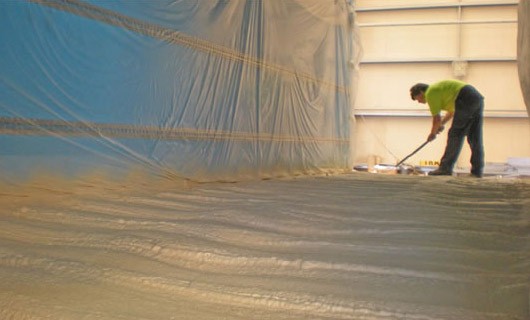POLYURETHANE SPRAY FOAM
 Polyurethane Spray Foam is an effective form of insulation in all buildings.
Polyurethane Spray Foam is an effective form of insulation in all buildings.
It expands on application, sealing small cracks and forming a barrier on the applied area. It is excellent for weather proofing and has the benefit of reducing infiltration by air, insects and noise.
Gunspray supplies Spray Foam Insulation for both commercial and residential customers Australia wide.
Spray-applied insulation reduces radiant heat transfer and is very versatile, having a wide range of applications. It is very effective when used to insulate storage buildings, silos, coolers, freezers and refrigerated air equipment on rail and truck transportation.
Spray-applied closed cell polyurethane foam is also ideal for insulating between wall layers and in stud walls, as well as for outside insulation applications.
Polyurethane Spray Foam Systems
Product range
- Full range of Fire Retardent & special use formulations – AS/NZS 3837:1998 Cone Calorimeter Test Performance certified products.Full Density range from 25 to 400 kg / m³
- Low halide systems for tank / pipe insulation applications.
- High density high pressure protective “hardcoat” systems for PU / EPS foam / timber substrates.
Applications
- Thermal insulation for roofs, walls, tanks, processing equipment – both internal and external application.
- Thermal insulation of industrial, commercial and agricultural buildings.
- Sealing of grain storage silos.
- Full range of products for Theme Park Movie set / “special effects” applications.
- Thermal insulation for roofs, walls, tanks, processing equipment – both internal and external application.
- Insulated Pipe (on site application).
- Animal Housing (Chicken Sheds etc).
- Artwork (Christmas Pageant Floats and Shop displays).
- Domestic insulation – Walls and ceiling.
- Boats – Refrigeration tanks and Buoyancy.
Spray foam insulation is a great alternative to other forms of building insulation such as fiberglass. A mixture composed of isocyanate and polyol resin is brought together at the tip of a specially designed gun, to form an expanding foam jet that is sprayed onto surfaces such as roof tiles, concrete slabs, into wall cavities, or through holes drilled in into a cavity of a finished wall to form an insulating barrier.
Polyurethane the most common type of spray foam insulation, was originally developed for the the military in the 1940s. It was first used in the 1970s as insulation.
Two component Spray foam can either be high pressure or low pressure, depending on the application. High pressure is generally used in new buildings and low pressure in wall cavtities on existing walls. – low pressure spray foam is also known as a slow injection foam.
Types
There are 2 types of spray foam insulation – open cell and closed cell.
Trained spray foam applicator applying open cell spray polyurethane foam insulation in wall cavities.
Open cell foam insulation
- Cells not completely closed.
- Less Expensive.
- Good Air Barrier.
- Not Water proof.
- Good noise reduction.
- Indoor use only.
Closed cell foam insulation
Closed cell foam insulation is much denser than open cell. It has a smaller, more compact cell structure. It is a very good air barrier as well as a water vapor barrier. It is often used in roofing projects or other outdoor applications, but can be used anywhere in the home.
- Much Denser.
- Closed smaller more compact cells.
- Good air barrier.
- Good water vapour barrier.
- Ok to use outside.
Benefits
- Saves on energy Costs.
- Thermal barrier, helping to keep home s warm in winter and cool in summer.
- Reduces Noise.
- Protects against Moisture – reducing harmful mould and mildew.
- Reduces chance of wood rotting.
- Helps to reduce allergies.
CONTACT US
Save on energy costs this season with your home or business:
0428 112 559
A: 14 Frost Road,
Salisbury 5108
PRODUCTS & SERVICES
Please select from our range of products & services below. Call or email us for further inquiries.
